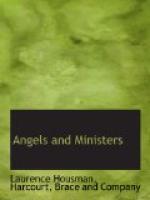EX-PRES. The Covenant was the instrument—and would have sufficed. So organised, America’s voice in all future contentions would have been too strong, and just, and decisive to be gainsayed. Then life would have been in it, then it would have prospered and become mighty. It would have meant—within a generation from now—world-peace. Of that I had a sure sense: it would have come. To make that possible, what I had to yield to present jealousies, discords, blindness, was of no account—only look far enough! For there, in the future, was the instrument for correcting them— the people’s vote for the first time internationally applied. And I had in me such faith that America, secure of her place in the world’s councils, would have wrought to make justice international, and peace no longer a dream! Was I wrong, Tumulty, was I wrong?
TUMULTY (expanding himself). No man who believes in America as much as I do will ever say you were wrong, Governor.
EX-PRES. But when America stood out—when the Senate refused to ratify— then I was wrong. For then, what I had backed—all that remained then—was a thing of shreds and patches. Nobody can think worse of the Treaty than I do with America out of it, with the Covenant left the one-sided and precarious thing it now is. Had we only been in it—the rest wouldn’t have mattered. Call it a dung-heap, if you like; yet out of it would have sprung life. It may still; but I shan’t see it, Tumulty; and that vision, which was then so clear, has become a doubt. Was I wrong—was I wrong to pretend that I had won anything worth winning? Would it not have been better to say “I have failed”?
TUMULTY. Forgive me, Governor: you are looking at things from a tired-out mind. That’s not fair, you know.
EX-PRES. But if you knew, oh, if you knew against what odds I fought even to get that! They knew that they had got me down; and the only card left me at last was their own reluctance to let a discredited President go back to his own people and show them his empty hands, and tell them that he had failed. So a bargain was struck, and this one thing was given me, that peradventure it might have life—if I, for my part, would come back here and plead the ratification of the Treaty which they—and I—had made. Could I have done that with any effect, had I said that in almost everything I had failed?
TUMULTY. Chief, I think you did right. But I still feel I’m up a back street. How could things have come to fail as much as they did? After all, it was a just war.
EX-PRES. Tumulty, I have been asking myself whether there can be such a thing as a “just war.” There can be—please God!—there must be sometimes a just cause for war. When one sees great injustice done, sees it backed by the power of a blindly militarised nation, marching confidently to victory, then, if justice has any place in the affairs of men, there is sometimes just cause




